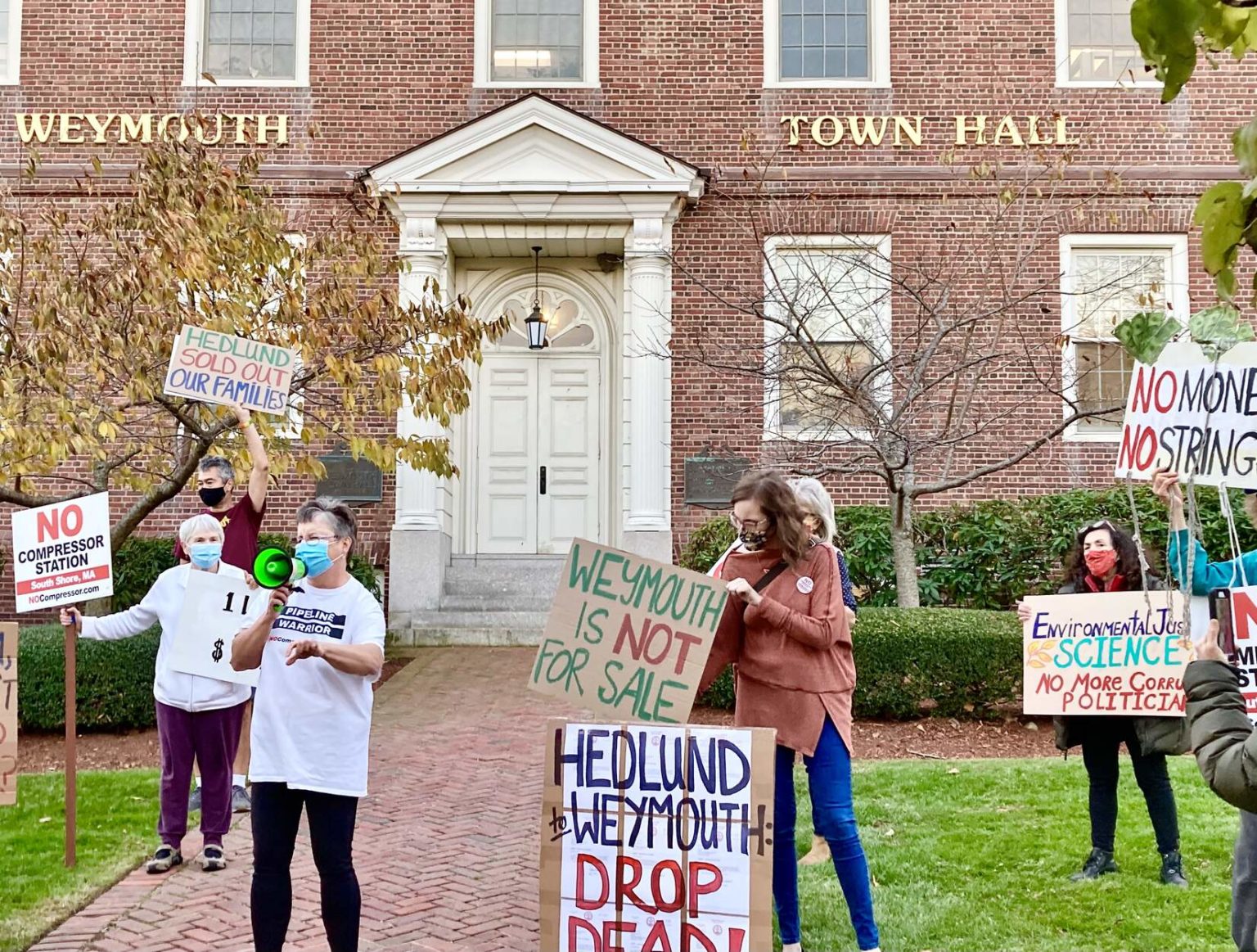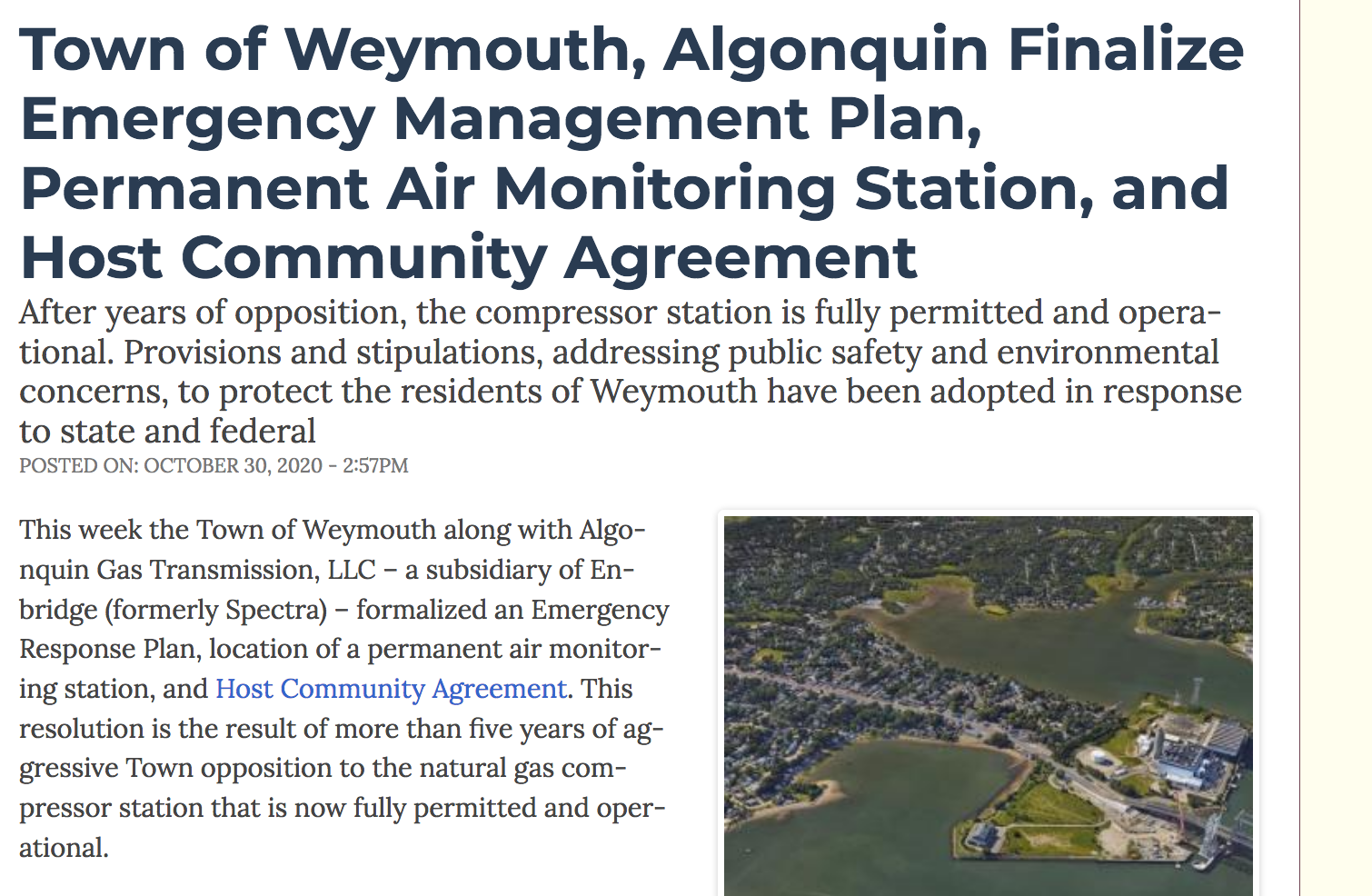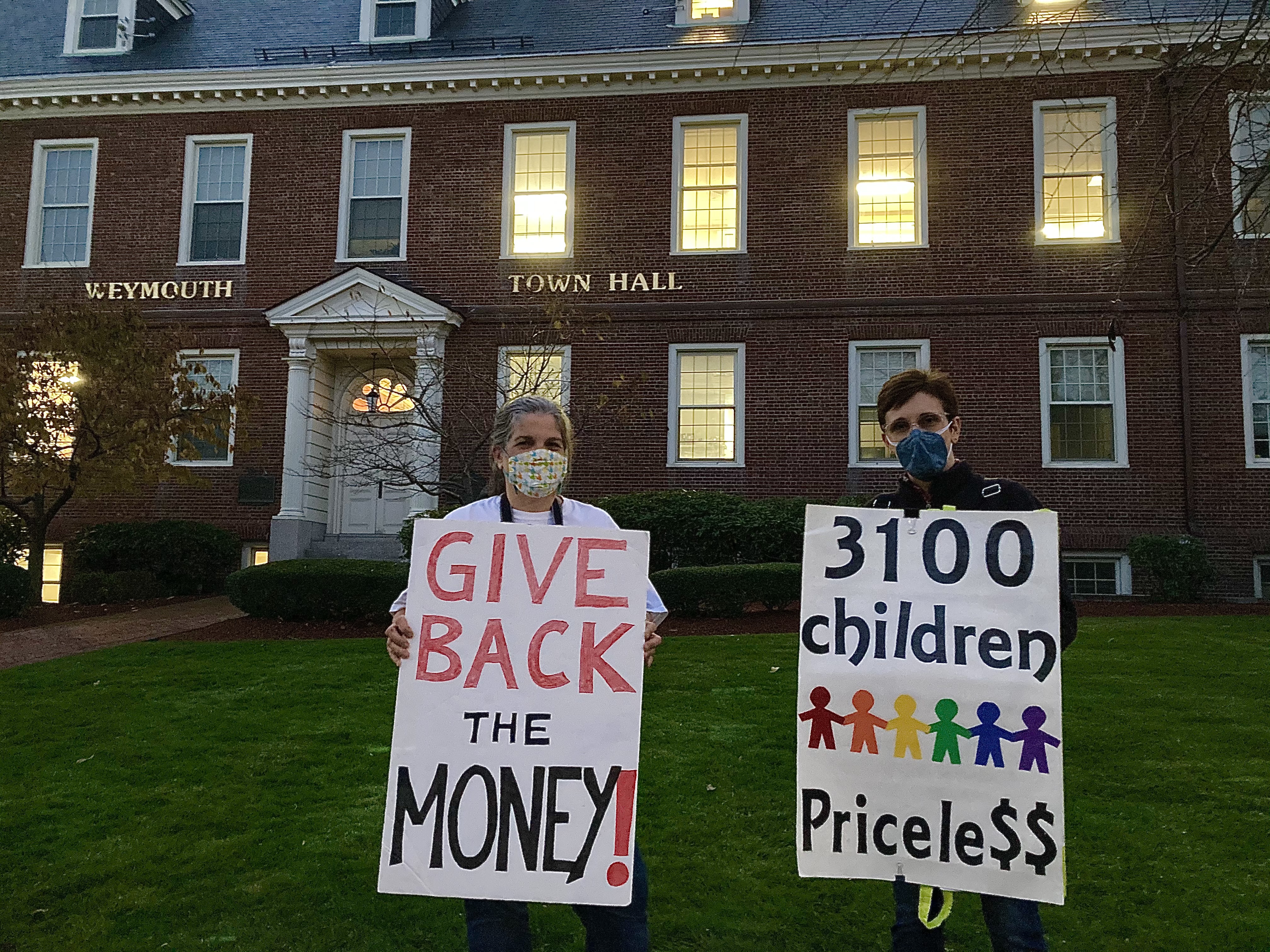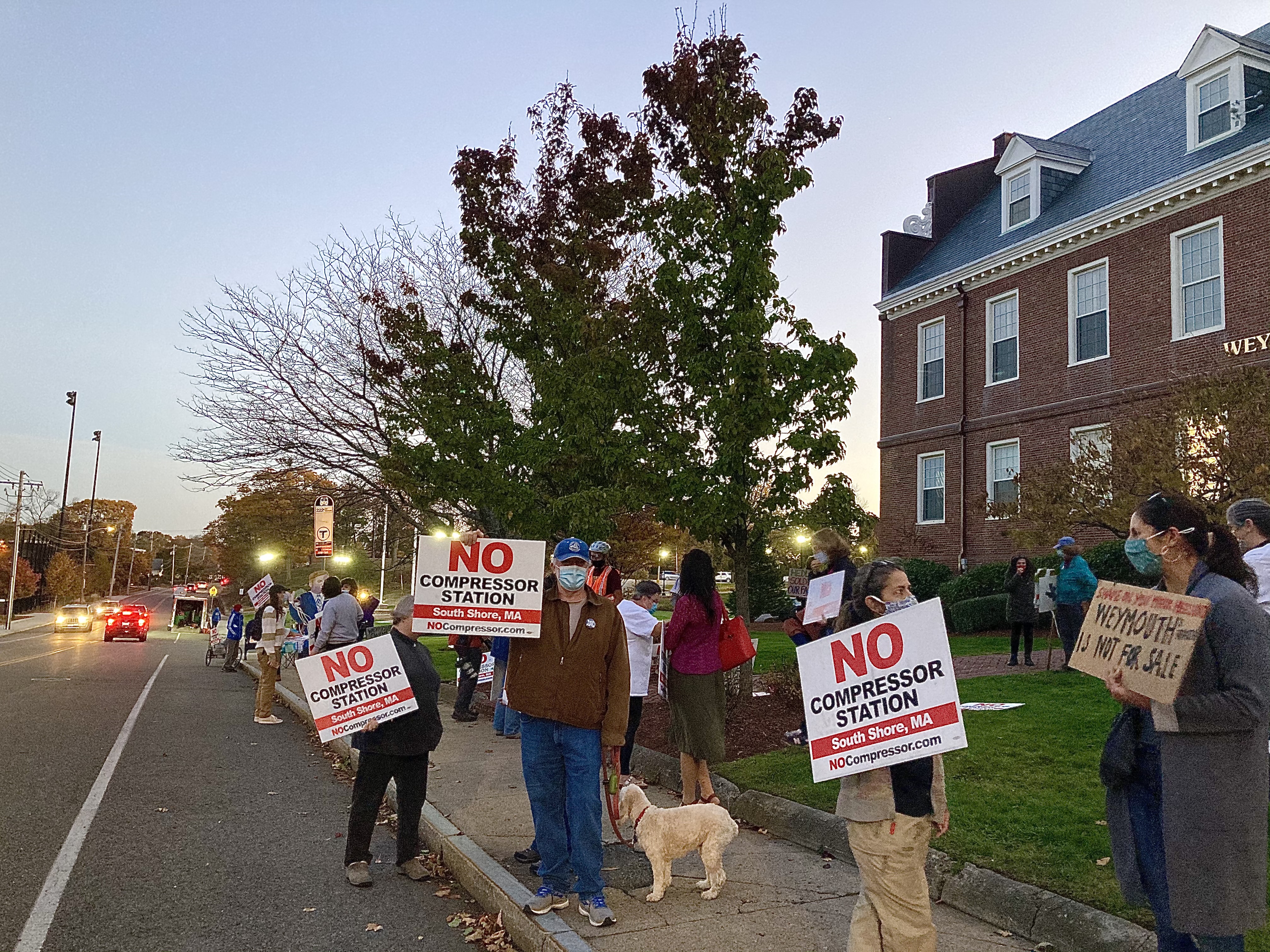Residents of Weymouth, Massachusetts, are raising questions about a deal made between the city and multi-billion dollar Canadian energy pipeline company Enbridge, Inc., with some calling the situation a “complete sell-off” that could jeopardize the health of the community and environment.
Protesters during a demonstration outside the town hall on November 6 accused the mayor of “colluding” with Enbridge by signing a $10 million settlement agreement dropping the town’s official opposition and legal fights against a newly constructed natural gas compressor station in town. Compressor stations, which pump large volumes of fracked gas at high pressure and are critical parts of gas pipeline infrastructure, are prone to hazards due to the extreme pressure by which the gas is processed.
The demonstration also comes after two recent accidental emergency shutdowns at the Weymouth compressor station less than three weeks apart — the facility is now under federal investigation. But despite this pending safety investigation, the Weymouth mayor struck an unexpected deal on October 30 with Enbridge, the owner of the compressor station, leaving town residents, neighboring municipalities, and even the town council without the town’s official support in their ongoing fight against the operation of the station.
In response to the mayor’s settlement agreement, the Weymouth Town Council voted unanimously this week to send a letter to the Massachusetts Attorney General asking her to look into the legality of the mayor’s newly agreed contract with Enbridge that effectively censures town officials from continuing to challenge the controverisal compressor station. This apparent silencing of the town’s legislative branch without its consent is potentially in violation of the town’s charter.
The town of Weymouth and the mayor had together opposed the compressor project for the last five years.
Wendy Cullivan, a Weymouth resident who attended the Friday demonstration, said the town’s 180-degree-manuever left community members and the town council high and dry in the battle with Enbridge. “From my perspective I’ve always looked to the town of Weymouth as the leader in the fight. When they relinquished themselves from that role last week, they didn’t tell anybody. They just dropped us like a hot potato,” she explained. “The way the agreement works is it carves out our town council from being active in the fight.”
Meanwhile, as concerns mount around the federal investigation into the facility’s two accidental shutdowns this fall, local residents and environmental activists are pointing to the controversial history of the consulting firm brought in to conduct the investigation, claiming there might be potential conflicts of interest involved.
The consulting firm, DNV GL, has previously worked with Enbridge on a number of occasions, leading some to question whether the firm can be truly considered independent. The federally mandated investigation requires the pipeline company to select an “independent third-party” to conduct the analysis.
Investigating Emergency Shutdowns
Enbridge and its subsidiary Algonquin Gas Transmission had planned to put the Weymouth compressor station into service October 1. The station, part of a gas pipeline system called Atlantic Bridge transporting fracked gas from Pennsylvania up into northern New England and Canada, is located in one of the most densely populated areas ever sited for such a facility in the U.S. — Weymouth sits along the Massachusetts coast roughly 12 miles south of Boston. Local residents and politicians have fought the project for years over health, safety, and environmental concerns, though federal and state regulators had granted permits and cleared the compressor station for service, including a final green light from the Federal Energy Regulatory Commission on September 24.
But following two emergency shutdowns in September that each released over 260,000 cubic feet of gas into the air, Enbridge was forced to delay the station’s operation while the federal Pipeline and Hazardous Materials Safety Administration (PHMSA) investigates these unplanned gas releases.
The first incident occurred on September 11 due to a gasket failure, as DeSmog previously reported. A second emergency shutdown followed on September 30 in which the station vented 275,000 cubic feet of gas, comprised mostly of the potent greenhouse gas methane, into the surrounding area. It is unclear what prompted the second shutdown.
A federal investigation was immediately called for, and PHMSA issued a Corrective Action Order to Enbridge on October 1 requiring the station be shut down while the two accidents are investigated and safety issues are addressed. While there were no injuries or fatalities from the accidents, “the release of large quantities of pressurized natural gas in a heavily populated area carries a substantial risk of fire, explosion, and personal injury or death and releases harmful methane into the environment,” PHMSA states.
“I find that continued operation of the Station without corrective measures is or would be hazardous to life, property, or the environment, and that failure to issue this Order expeditiously would result in the likelihood of serious harm,” Alan Mayberry, Associate Administrator for Pipeline Safety at the federal agency, wrote in the order.
One requirement of this order is that Enbridge complete a safety inspection called a “root cause failure analysis” (RCFA) within 90 days; this is to be “supplemented or facilitated by an independent third party.”
Screen shot of clause in Corrective Action Order requiring Enbridge to complete a safety analysis through an “independent third-party.”
To conduct this independent analysis Enbridge has selected a consulting firm which works closely with the oil and gas industry and has a history working for Enbridge. This close relationship with the oil and gas sector has reignited past concerns over potential conflicts of interest.
DNV GL‘s Conflicts of Interest
Multiple sources confirmed to DeSmog that Det Norske Veritas, or DNV GL, was chosen to conduct the Weymouth compressor’s safety analysis; the Norway-based consultantcy firm works with the maritime industry and is a technical advisor to the oil and gas industry.
The firm has a track record of working with Enbridge. DNV GL USA, for example, is currently working on developing a pipeline coating material to mitigate methane emissions from pipe corrosion. Enbridge is also involved in this project, funded largely through a Department of Energy grant.
DNV GL was also embroiled in a conflict of interest scandal involving the Enbridge Line 5 pipeline project in Michigan several years ago.
In 2017, the State of Michigan terminated a contract with the consultancy firm for a risk analysis on the Enbridge Line 5 oil pipeline running below the Straits of Mackinac, after learning that a DNV GL employee substantially involved in that analysis subsequently worked on another project for Enbridge in violation of the contract’s conflict-of-interest terms. “The evaluations of Line 5 were supposed to be independent, not tainted by outside opinions or information, but that’s not what happened,” then-Michigan Attorney General Bill Schuette said in a statement, as reported by the Detroit Free Press.
DNV GL was also contracted with Enbridge on a project that was subject to a federal Department of Justice settlement pertaining to the 2010 Kalamazoo River oil spill. This analysis conducted by DNV GL involved leak detection and oil spill modeling for Enbridge pipelines including Line 5, and was started while the firm was finalizing its Line 5 risk analysis for the state of Michigan.
In July 2017, a month after Michigan fired the DNV GL firm for the Line 5 risk analysis, the Pennsylvania township of Middletown contracted with the firm for a risk assessment on the Mariner East 2 pipeline, a project of petroleum company Sunoco. DNV GL in 2016 helped to defend Sunoco against federal charges of unauthorized and unqualified welding procedures and workers in an investigation into a spill from the Permian Express II pipeline in Texas. This Texas incident raised further conflict of interest concerns. But Middletown’s chair of its Board of Supervisors brushed aside this concern, writing in an email, as reported by StateImpact Pennsylvania: “Merely associating with Sunoco does not immediately render a vendor’s work untrustworthy.”
DNV GL also works closely with the energy utility company National Grid, which had originally signed on as one of the “shippers,” or buyers, of the gas from the Atlantic Bridge Project.
All of this context raises questions about how “independent” this consulting firm would be able to be when it comes to inspecting an Enbridge project like the Weymouth compressor.
“Given that the federal government clearly stated that the third party conducting the review into the two troubling accidents at the station must be independent, DNV GL‘s hiring raises some serious red flags,” says Itai Vardi, a researcher with the fossil fuel industry watchdog group the Energy and Policy Institute (and a former reporter for DeSmog). “The firm’s relationship with Enbridge is problematic, and it was even caught in a conflict of interest when supposedly conducting an unbiased review of one of the company’s pipelines in Michigan.”
“What’s more, DNV GL worked until at least last year for National Grid, one of the gas customers of Enbridge’s Atlantic Bridge project,” Vardi added. “This is a serious matter, lives are at stake. The thousands of people who live within a mile of the station’s radius, including an environmental justice community, need to be able to count on the government to conduct a truly objective investigation. So PHMSA needs to explain why it greenlighted this hire.”
PHMSA did not immediately respond to an inquiry asking if the agency has approved Enbridge’s selection of the DNV GL firm. DeSmog reached out to DNV GL, and a spokesperson for the firm declined to comment and deferred to Enbridge on questions regarding the firm’s contracts with Enbridge. A spokesperson for Enbridge did not respond to a request for comment on the company’s hiring of DNV GL and on conflict of interest concerns.
Weymouth Mayor Drops Town’s Fight in Deal With Enbridge
Further suspicions of undue influence from the pipeline company arose when the town of Weymouth, via Republican Mayor Robert Hedlund, suddenly entered into a “host community agreement” with Enbridge — a contract outlining conditions for a town hosting such a facility — on October 30. The agreement requires Weymouth to drop its official opposition to the compressor station after years of fighting the project.
This contract, by which Enbridge subsidiary Algonquin Gas agreed to pay the town $10 million up front (to be used at the town’s discretion, reportedly for addressing public safety, health, and environmental concerns in town), was signed unilaterally by the mayor without input from the Weymouth Town Council. The contract even includes a provision prohibiting Town Council or other town officials from continuing legal actions or other opposition to the compressor station operation. This provision has raised concerns among the Weymouth Town Council and prompted the Council to seek a legal opinion from the Massachusetts Attorney General regarding the mayor’s executive authority to effectively silence the town’s legislative branch.
Here’s a clause where the Weymouth Mayor declares himself to be the one & only decision maker on the Compressor & pledges obedience to Enbridge to do its bidding to silence any opponents. pic.twitter.com/RRlu0HlTQx
— Nathan Phillips (@nathanpboston) October 31, 2020
The compressor station is currently under investigation for the two accidents. These occured during pre-service testing of the facility, and while fully constructed, the station has since been put on pause and has not yet been able to begin operations.
But a press release from Mayor Hedlund on the agreement emphasizes that the station is “fully permitted and operational.” This raises the question of whether the mayor assumes the outcome of the federal safety investigation — conducted by a consulting firm close to Enbridge — is predetermined to favor Enbridge. Mayor Hedlund did not respond to a DeSmog question on this specific point.
Screen shot of Weymouth press release announcing the mayor’s host community agreement with Enbridge over the controversial gas compressor station.
Weymouth’s $10 million settlement with Enbridge has upset local residents and the community group Fore River Residents Against the Compressor Station (FRRACS) that’s been fighting this project for years mainly over health, safety, and environmental concerns. FRRACS calls the mayor’s settlment with Enbridge a “hush money” deal, arguing it was agreed with no consideration to the local activists and neighboring communities that continue to oppose this dangerous compressor station.
“Our disappointment lies in how this was executed. Not only is the contract potentially not valid, but the manner in which the other municipalities and FRRACS were treated by the mayor, by the solicitor, was abominable,” FRRACS executive director Alice Arena said during the protest in front of Weymouth Town Hall last week. “The biggest disappointment is selling out our lives,” she added. “Selling out the health and safety of our community for a lousy $10 million.”
Lisa Jennings of Weymouth (left), and Suzanne Brothers of East Braintree (right), protest the Weymouth mayor’s $10 million settlement deal with Enbridge outside Weymouth Town Hall on November 6, 2020. Credit: Dana Drugmand
Local news reports on the town’s settlement agreement indicated the town could receive an additional $28 million in tax revenue from the operation of the compressor station over 35 years through changes in the tax structure, but this is not guaranteed in the contract with Enbridge/Algonquin Gas. Although the town and Algonquin Gas said they would work with the Massachusetts Department of Revenue to alter the tax code to benefit the town, nothing in the contract forces the pipeline company to pay additional tax. Indeed, as stated in the contract, “Algonquin bears no additional financial or other obligation should such change in [tax value] methodology not occur.”
According to FRRACS, Spectra (the energy firm originally behind the project before it was bought out by Enbridge) had in 2016 offered the town $47 million as a settlement. “Why would you sign [the settlement] now? Number one,” Arena told DeSmog, describing questions surrounding the mayor’s agreement. “Number two, why are you accepting less than half of what they offered you the last time?”
Rob McCarthy (center, blue hat) and other community members demonstrate outside Weymouth Town Hall on November 6, 2020. Credit: Dana Drugmand
Rob McCarthy, a Weymouth resident who attended the November 6 FRRACS protest opposing the mayor’s deal, said it is disappointing the town is “taking $10 million as a settlement, which is not even as good as the initial [offer] of $47 million.”
“It’s a complete sell-off as far as I’m concerned,” he said.
“As the town council, we were not involved in the decision process to take this money. Our feedback wasn’t even considered. So I want to make that very clear,” Weymouth Town Council member Pascale Burga, representing North Weymouth, said during the demonstration. Mayor Hedlund did not respond to a DeSmog question on why he signed the contract without input or involvement from the town council.
During their meeting Monday evening, November 9, the Weymouth Town Council voted unanimously in favor of sending a letter to the Massachusetts Attorney General and the Massachusetts Inspector General requesting an investigation into the mayor’s settlement agreement with Enbridge.
“The Town Council has dire concerns that a unilateral contract was signed by the executive branch of government that seems to dictate or threaten the actions or future actions of the legislative branch of government,” the letter concludes.
Arena, the leader of FRRACS, told DeSmog she suspects Mayor Hedlund may have been “colluding” with Enbridge. “We sent a letter to Hedlund on Monday [November 2] for all intents and purposes accusing him of colluding with Enbridge against the best interests of the town,” she said.
Arena added that FRRACS is not giving up its opposition, even if the mayor has dropped the ball. “We will continue to fight the operation of this compressor station,” she said. “Our goal is to make this a stranded asset for Enbridge.”
Main image: FRRACS president Alice Arena speaks during the protest outside Weymouth Town Hall on November 6. Credit: Dana Drugmand
Subscribe to our newsletter
Stay up to date with DeSmog news and alerts










